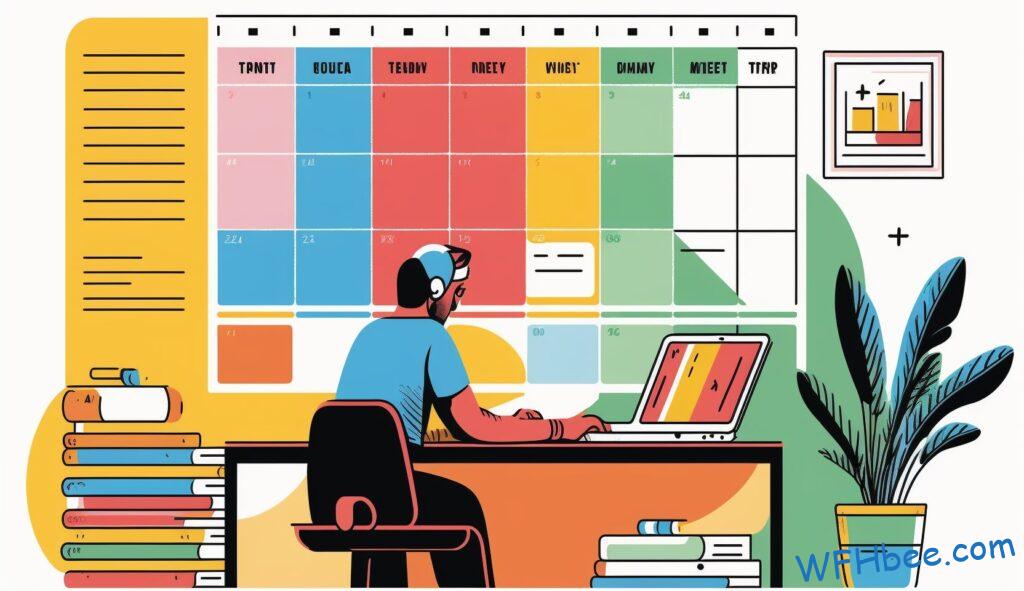Do you struggle to stay focused when working from home? Are you constantly tempted to procrastinate instead of get your work done? It’s a common challenge that many people face today. With the right strategies and tools, however, it’s possible to overcome procrastination and make the most out of your time while working remotely.
In this article, we’ll look at how you can avoid procrastinating when you’re working from home. We’ll cover why it happens in the first place, as well as practical steps for overcoming distractions and focusing on what matters. By following these tips, you’ll be able to maximize your productivity without sacrificing your freedom or happiness.
Most importantly, we’ll discuss how using simple techniques like setting goals and taking regular breaks can help give structure and purpose to your day so that you don’t end up feeling overwhelmed or unproductive. So if you’re ready to learn more about avoiding procrastination and making efficient use of your time at home, then let’s begin!

Here’s what we’ll cover:
Table of Contents
Definition Of Procrastination
Do you ever feel like no matter how hard you try, you can never get anything done? That’s because you’re probably procrastinating. But what is procrastination really? Procrastination is the act of postponing or delaying something that needs to be done. It’s all too easy to fall into this pattern when working from home and it has serious consequences. So, let’s take a closer look at what procrastination means.
At its core, procrastination is an avoidance behavior where individuals choose short-term pleasure over long-term gain. It could be as simple as scrolling through social media instead of doing work or putting off important tasks until the last minute. Whatever form it takes, procrastination is ultimately a way to avoid responsibilities in your life—responsibilities which can give us structure and purpose if we don’t put them off.
The truth is, procrastination keeps people from reaching their full potential and leads to feelings of guilt and anxiety about unfinished tasks. To prevent this cycle from taking hold, understanding why we procrastinate in the first place is key. With that knowledge under our belts, we’ll be better equipped to tackle causes of procrastination head-on and make progress on whatever project lies ahead!

Causes Of Procrastination
When working from home, it is easy to procrastinate. Knowing the causes of procrastination can help you take steps to combat it. Below are some common reasons for procrastinating:
- Fear of failure – When we feel that a task may be too difficult or overwhelming, our natural instinct is often to put it off until later. This fear of failure leads us to delay starting on the project and getting closer to achieving our goal.
- Lack of motivation – Working from home can be isolating, which makes it harder to stay motivated in completing tasks. Without someone else pushing us along, we may find ourselves constantly putting things off in favor of other activities that seem more fun or interesting at the time.
- Not enough clear direction – If there isn’t a sense of purpose behind what we’re doing, then it’s easier to lose focus and start procrastinating instead. Having an end goal in mind gives us something tangible to work towards and keeps us focused on finishing the task at hand!
- Boredom – Even if you have a strong understanding of your goals and objectives, sometimes boredom creeps in when working from home and this can make it much more tempting to get sidetracked with less important tasks (or even no tasks at all!).
It’s important not just to recognize these potential root causes but also act upon them by taking proactive measures like setting deadlines for yourself or breaking down big projects into smaller chunks so they don’t become overwhelming. Understanding the underlying issues behind why we might be prone to procrastination will go a long way towards helping us successfully avoid falling into its trap! Moving forward, let’s look at how we can identify warning signs when procrastination starts creeping up on us…

Warning Signs Of Procrastination
When working from home, it’s easy to fall into the trap of procrastination. Knowing the warning signs can help you recognize when this is happening and take steps to avoid it. To get ahead of the game, here are some key indicators that you may be procrastinating:
1) You’re spending too much time on leisure activities – If you find yourself taking frequent breaks for coffee or scrolling through social media instead of getting down to work, then these are all warning signs that you’ve been procrastinating.
2) Your productivity has decreased – When your workload suffers due to lack of focus or effort, this could indicate that you are avoiding tasks at hand by putting them off until later.
3) You keep making excuses – Everyone has a legitimate reason why they cannot complete their work, but if these excuses become more frequent than usual then this is a sign of procrastination.
It’s important to pay attention to these warning signs in order to nip any potential procrastination in the bud. Identifying triggers for procrastination will go a long way towards helping you stay productive when working from home.

Identifying Triggers For Procrastination WFH
Identifying triggers for procrastination is key to avoiding it when you work from home. Triggers can be anything that causes us to delay getting on with tasks, and they vary greatly depending on the individual. Some common examples include feeling overwhelmed by a task, lack of motivation or inspiration, fear of failure or success, boredom, distractions around the home, lack of structure or organization in your workspace, and unmet expectations.
To avoid procrastination when working from home, start by evaluating what’s causing you to put off certain tasks. Ask yourself why a particular project feels so daunting; look at your environment and see if there are distractions that could be eliminated; consider how organized your workspace is compared to an ideal office; think about any time management techniques you might need to employ. Doing this assessment will help you identify which triggers are leading to procrastination so you can take actionable steps towards overcoming them.
It’s also important to set realistic goals and create an effective plan for achieving them. Make sure the goals are specific and measurable – e.g., instead of saying “I’m going to finish my report,” say “I’m going to write 500 words every day until I complete my report.” Then break down each goal into manageable chunks and schedule out those activities over several days or weeks until the desired outcome has been achieved. Achieving small successes frequently helps build momentum as well as confidence in completing larger projects successfully. With these strategies in place, it’s easier to focus on one task at a time without feeling overwhelmed or delayed by procrastination while working from home.
By recognizing our own personal triggers for procrastination and putting plans in place for avoiding them we can stay productive even when working remotely. Planning and scheduling ahead of time allows us to feel more confident tackling large-scale projects without delaying progress due to procrastination habits.
Planning And Scheduling When Working From Home
When working from home, having a plan is key to avoiding procrastination. Planning and scheduling your day makes it easier to stay focused on tasks and reach goals in a timely manner. Time management techniques like setting deadlines for yourself are essential when you don’t have someone else keeping track of what needs to be done. With the right schedule planning and time management strategies, you can ensure that all tasks get completed without falling behind or wasting valuable time.
Goal setting also plays an important role in staying productive while working from home. Setting realistic goals helps keep motivation high and encourages focus on specific areas of work. Establishing achievable objectives gives direction and purpose to each task at hand so that energy isn’t wasted on unimportant matters. It’s beneficial to break down big projects into smaller chunks so they’re more manageable instead of overwhelming yourself with too much at once.
Organizing your workspace can help create a suitable environment for productivity as well. Clutter-free workspaces provide peace of mind by helping reduce distractions which prevents burnout and exhaustion due to multitasking or overworking oneself. All these tactics combined will lead to better efficiency when working remotely, making it easier to finish assignments on time without succumbing to procrastination.
Transition sentence: This improved efficiency leads directly towards setting goals and creating deadlines for yourself – something that’s absolutely necessary for success when working from home.

Setting Goals And Creating Deadlines In Remote Settings
It is easy to become overwhelmed when you work from home. Just like a ship in the open sea, it can be difficult to stay focused and find direction without an anchor or map. To avoid procrastination and stay on track, setting goals and creating deadlines are essential time management techniques that will help you chart your course with clarity and purpose.
Here are five key tips for setting goals and creating deadlines:
- Identify what needs to get done first, then break down tasks into manageable chunks.
- Set realistic expectations by taking into account any external factors that could impact your progress.
- Establish a timeline for each task so you can keep yourself accountable along the way.
- Reward yourself for meeting milestones or completing large projects.
- Allow yourself some flexibility if plans change unexpectedly or you experience delays due to unforeseen circumstances.
By structuring our days through goal setting and deadline creation, we give ourselves permission to take control of our lives instead of being controlled by them. This sense of independence allows us to live life more fully, giving us the freedom to pursue meaningful pursuits while remaining productive at home. With this mindset, it becomes easier to resist the siren call of procrastination and focus on achieving success with greater efficiency!

Breaking Down Tasks Into Manageable Chunks
When working from home, it can be difficult to avoid procrastination. One way to stay on top of tasks is to break them down into smaller chunks. This will help you focus and remain motivated by allowing you to make incremental progress with each task. It also makes the workload seem more manageable and less overwhelming.
To successfully divide tasks into manageable chunks, start by writing out a list of all the tasks that need to be done. Then consider how long each one should take and estimate a timeline for completion. Next, prioritize which ones should be done first based on importance or urgency. Finally, break these larger projects into individual steps that are easier to manage in terms of time and effort.
By breaking your work down into small parts, you’ll have an easier time staying focused and avoiding procrastination as well as feeling a greater sense of accomplishment when you finish each step along the way. Establishing a routine can help ensure success in accomplishing goals while working from home without succumbing to distractions or burnout.

Establishing A Routine When You Work Virtually
The sun is setting, and the promise of a new day approaches. Establishing a daily routine, including a dedicated lunch routine, can help break free from procrastination when working from home. Creating habits that will remain consistent throughout the week will put you in a productive mindset and make it easier to prioritize tasks.
When crafting your routine, start small by focusing on the basics like getting dressed for work or making your bed each morning – this will have an accumulative effect over time. Once you’ve established these simple practices, gradually add more manageable activities such as reading for 20 minutes before lunch or doing some light stretching after dinner.
Developing a schedule that works best for you is key; find what fits with your lifestyle and preferences to ensure productivity and balance. Setting up reminders or alarms on your phone can be helpful if needed. With consistency and dedication, creating positive routines at home can help steer away from procrastination while still allowing freedom to enjoy life’s moments. Having structure in place will provide focus and set yourself up for success to move onto the next section: Prioritizing Tasks.

Prioritizing Tasks While Telecommuting
Prioritizing tasks is an essential part of working from home successfully. Without proper organization and task prioritization, it’s easy to become overwhelmed or procrastinate due to lack of focus. One way to prioritize tasks is by organizing them according to importance and urgency. This can be done with a simple list that categorizes each task according to its importance. Additionally, time management techniques such as setting deadlines for yourself can help you stay focused on the most important tasks first while avoiding any unnecessary distractions.
Another helpful technique in task prioritization is breaking down larger projects into smaller chunks. Doing this makes large projects appear more manageable and less overwhelming than tackling one big project all at once. It also allows you to better track your progress so that when you reach the end, you have accomplished something tangible instead of feeling like nothing has been achieved despite hours spent doing work.
By integrating these strategies—task organization, time management, and breaking down large projects—into your daily workflow, you will find yourself being more productive and ultimately avoiding falling prey to procrastination. With effective planning and diligence, it’s possible to make tremendous strides towards achieving success even when working from home!

Removing Distractions At Home
Now that you have prioritized your tasks, the next step is to remove distractions so you can effectively work from home. To do this, it’s important to recognize what types of distractions are in your environment and take steps to minimize them as much as possible. Here are a few tips for avoiding distractions:
- Turn off notifications on your phone and computer when working.
- Set specific times during the day where you focus solely on completing tasks without interruption from others or yourself.
- Create an organized workspace free from clutter and noise.
It’s also wise to think about how long you plan to work before taking breaks. If you find yourself procrastinating during your work hours, it could be because of fatigue or lack of motivation–and taking regular breaks can help with both! Build small periods into your schedule where you can get away from your desk and stretch out, grab some fresh air outside, or watch something entertaining for a few minutes. Doing this will give you mental clarity while allowing you to stay focused on achieving more throughout the day.

Taking Breaks
Working from home can be a great way to maintain productivity, but it also has its own set of unique challenges. One of the greatest among them is avoiding procrastination and staying disciplined while working in an environment that doesn’t demand structure. Taking regular breaks can help keep you motivated and avoid burnout.
The key to taking effective breaks is breaking up your day into manageable chunks. Micro-breaks are short pauses throughout the workday where you step away from your work for five minutes or less to clear your mind and refocus yourself on what needs to get done. This could include activities like stretching, going for a quick walk outside, or having a cup of coffee with a friend. Power naps are another option for quickly recharging during the day – just make sure not to sleep for too long!
By properly structuring breaks throughout the day, you will stay energized and focused on getting tasks completed so that when it’s time to call it quits, you’ll actually feel accomplished instead of feeling like more work awaits tomorrow morning. Moving forward, staying accountable with yourself and focusing energy on completing goals each day will ensure continued success at home-based productivity.

Staying Accountable
Life at home can feel like an endless cycle of procrastination and self-sabotage. To break the habit, it’s essential to stay accountable for your work. Like a lighthouse in dark seas, having accountability keeps you on the right path when distractions surround you.
Self-discipline is key to staying accountable while working from home. It means taking responsibility for yourself and following through with commitments even when faced with temptation or difficult tasks. Make sure that deadlines are realistic and set goals as if someone else were depending on them – this will help create structure so that you don’t get off track easily.
Time management is also important because it helps prioritize tasks efficiently. Create a schedule each day that works best for you and stick to it by mapping out what needs to be done first, second, etc., and allotting time blocks accordingly. This way, instead of wasting precious energy worrying about how much there is left to do, focus on one task until its completion before moving onto the next one — this will keep your motivation up! Transitioning into the subsequent section without saying ‘step’, take small steps towards success: start working in blocks of timeduring your days from home to build momentum and avoid falling back into bad habits.

Working In Blocks Of Time
Staying accountable when working from home is essential, but it’s just one piece of the puzzle. The next step in successfully avoiding procrastination while working remotely is to practice effective time management techniques. Time blocking and focus blocks are two great strategies that can help you stay on track with your work tasks and goals.
Time blocking involves breaking up each day into smaller chunks of time dedicated to specific activities or tasks. By setting aside a certain amount of hours for different projects, such as an hour for emails followed by 2 hours of focused writing, you’re able to compartmentalize different parts of your job and reduce distractions throughout the day. This technique also helps you maintain better control over where your energy goes and how productive you’ll be during those set periods of time.
Focus blocks are similar to traditional time-blocking techniques, except they allow for more flexibility within the allotted timeframe. Instead of following strict hourly increments, focus blocks give you more freedom to manage your own schedule within a designated period (such as half-day sessions). During these longer stretches, you can take breaks between tasks if needed and refocus yourself towards accomplishing short-term objectives at regular intervals throughout the session.
By leveraging technology tools like task managers and productivity apps, both time blocking and focus block methods can be easily implemented into any remote worker’s daily routine. Having access to these helpful resources makes it easier than ever to organize your workflow in a way that prevents procrastination while still allowing plenty of room for creativity and restful pauses along the way. With careful planning and dedication, anyone who works remotely can learn how to make the most out their days without sacrificing quality or efficiency!

Leveraging Technology Tools
In this day and age, technology can be a boon for those who need help managing their time. There are countless task-management and time-tracking apps available to keep one on track when working from home. Not only do these productivity-apps save precious minutes of the day, they also provide an effective way to hold oneself accountable in order to ensure that tasks are completed in a timely manner.
One key advantage of using such tools is that they allow users to create personalized reminders so they never miss important deadlines or appointments again. In addition, many of these apps offer features like customizable calendars and notifications that can be synced across devices – allowing them to stay up-to-date with their work no matter where they are located.
Furthermore, taking advantage of these digital solutions can make it easier to set achievable goals, manage multiple projects simultaneously, and even increase the overall efficiency of one’s workflow. All of which makes it possible for even the busiest people to get more done without feeling overwhelmed by their workloads. As a result, embracing technology is an invaluable tool for anyone looking to avoid procrastination while working from home and achieve greater success in life.
Seeking professional help can also be beneficial when trying to overcome excessive procrastination habits; however, leveraging technology tools provides an accessible solution for all levels of productivity needs.

Seeking Professional Help
One of the best ways to avoid procrastination when you work from home is to seek professional help. A procrastination therapist or counselor can provide specialized advice, as well as give guidance on how to improve your productivity and time management skills.
Professional procrastination help may come in many forms – such as cognitive-behavioral therapy (CBT) or motivational interviewing (MI). Both are designed to identify underlying psychological issues that could be causing procrastination, and then helping to develop strategies for overcoming those issues.
If more traditional methods don’t seem like a fit for you, there are online courses and self-help books specifically tailored towards people who struggle with procrastination. Whether it’s through counseling sessions or an independent study program, getting professional assistance will make all the difference when it comes to finally conquering your procrastination habits.
Finding solutions that work for you is essential in order to achieve greater freedom while working from home. With patience and dedication, you can put yourself on track toward achieving success without sacrificing your wellbeing or happiness.

Wrap Up
To conclude, procrastination can be a daunting task to overcome when working from home. As we have seen, it is important to identify triggers for procrastination and develop strategies like planning and scheduling, staying accountable, and leveraging technology tools that will help manage the urge to procrastinate.
It may feel like an uphill battle at times but with determination and perseverance you can get back on track and stay there – just like a phoenix rising from the ashes! The key is developing self-discipline so that your focus remains firmly fixed on completing tasks in order to reach your goals.
Remember: no one said achieving success was going to be easy; however, if you set yourself up for success by taking control of how you spend your time each day then you’ll soon find yourself enjoying the rewards that come with being productive while working from home.
Author: Robin Borg
Hi, I’m Robin. I have been working from home at least one day a week during all of my adult life. I have a background in research and data science. Get to know me better in the About page.







